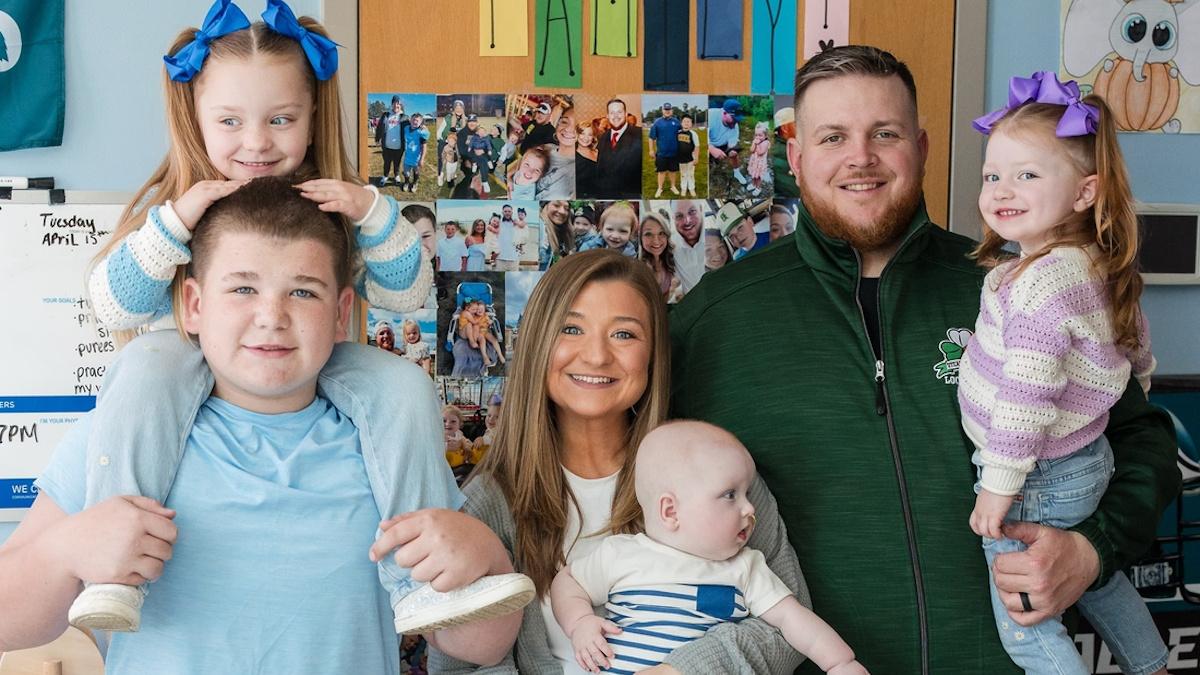World first as infant gets personalised CRISPR therapy

KJ's parents, Kyle and Nicole, and his three siblings.
In a medical breakthrough, a child diagnosed with a rare genetic disorder has received a bespoke CRISPR gene editing therapy to correct the mutation, and is already showing signs of thriving.
The infant was born with a metabolic disorder called severe carbamoyl phosphate synthetase 1 (CPS1) deficiency, in which the lack of an enzyme causes a build-up of ammonia in the blood, leading to serious neurodevelopmental delays and has a 50% mortality rate in early infancy.
Treatment typically involves a specialist, low-protein diet and nitrogen scavenger drugs to reduce the amount of ammonia being produced in the body, which can be complex and challenging – particularly in very young patients – and often go on to need a liver transplant.
In February, a medical team from Children's Hospital of Philadelphia (CHOP) and Penn Medicine in the US administered the first infused dose of a CRISPR drug designed to correct the gene coding for the deficient enzyme, when the child – known as KJ – was just over six months old, with a second and third doses administered over the next couple of months.
In the weeks after the treatment, he was able to increase the amount of protein in his diet and halve the dose of nitrogen scavengers needed to keep blood ammonia levels under control, according to the researchers, who have published a case study in the New England Journal of Medicine (NEJM). There were no signs of ill effects, and he has also been able to recover from certain typical childhood viral illnesses without ammonia building up in his body.
While longer follow-up is needed to make sure the benefits are durable, the treatment is a major milestone on the path to wider use of personalised base-editing therapies to correct disease-causing genetic mutations for which no treatments are currently available.
"Years and years of progress in gene editing and collaboration between researchers and clinicians made this moment possible, and while KJ is just one patient, we hope he is the first of many to benefit from a methodology that can be scaled to fit an individual patient's needs," said Rebecca Ahrens-Nicklas, director of the Gene Therapy for Inherited Metabolic Disorders Frontier Programme (GTIMD) at CHOP.
Ahren-Nicklas and Kiran Musunuru of Penn's Perelman School of Medicine have been working on creating customised gene editing therapies for individual patients since 2023. After deciding to focus on urea cycle disorders – and specifically CPS1 – they designed and manufactured a base editing therapy delivered via lipid nanoparticles to the liver in order to correct KJ's very specific mutation.
"While KJ will need to be monitored carefully for the rest of his life, our initial findings are quite promising," said Ahrens-Nicklas.
The achievement has been celebrated by researchers around the world. Prof Marc Güell, coordinator of the Translational Synthetic Biology research group and full professor at Pompeu Fabra University (UPF) in Spain, described the case study as being "of the highest quality and totally extraordinary. In fact, I was deeply moved to read it."
He added: "Individualised, tailor-made therapies for a single patient are no longer a dream. Obviously, the process followed is of very high complexity and will require a lot of work to see how to scale it up and expand it to other cases. In any case, this work sheds a lot of light on the future."












